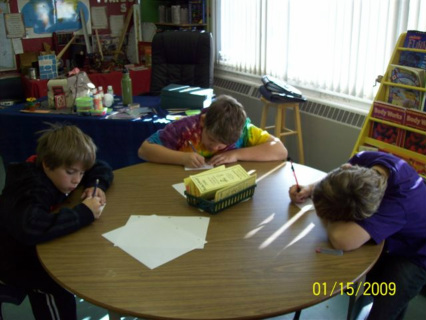Type II

Type II Enrichment experiences come in two varieties: thinking skills, and “working” skills. Thinking skills encourage creativity, problem solving and critical thinking. The “working” skills include how-to skills, the appropriate use of various resources, and written, oral and visual communication skills. Both types of skills are needed to successfully complete a Type III Independent Investigation. Enrichment Activities promote the development of thinking and feeling processes such as: creative thinking, problem solving, and critical thinking skills; a wide variety of specific learning how-to-learn skills; skills in the use of advanced-level reference materials; and written, oral, and visual communication.
Type II is the teaching component of Triad, and although the teacher facilitates what the student is learning in this stage, students are scaffolded and they eventually reach independence, enabling them to conduct research, problem-solve, and make decisions. Students are taught how to communicate what they have learned through writing, presenting, and creating products relative to their topic.
One way that teachers can have students practice their research, writing, and presenting skills is through the implementation of the Independent Reading Program (IRP) in the classroom. The IRP provides students with a formal guide to walk them through the steps of conducting research. Students will choose a topic, research their topic, write a summary with questions and answers, create a title page, complete a vocabulary page, and a small product about the topic. The IRP is beneficial for use in the classroom because it is cross-curricular and can be done in any discipline. When the student is ready, they are able to present what they have learned to their classmates and teacher. Students receive feedback from their peers at the end of the presentation and a rubric with feedback from the teacher. Using IRP in the classroom gives the student the ability to have a Triad experience on a smaller scale and the rubric provides formative assessment that can be used to grow and develop in their presentation and research skills. The skills that students learn through doing Type II investigations through IRP are direct preparation for their Type III investigation and presentation.
Students can conduct research for IRP and Type II investigations using many resources which are commonly available in schools, such as books, textbooks, encyclopaedias, internet searches, and interviewing. It is essential that students conduct their own research, so that they learn how to find answers to their queries and gain confidence in their abilities as an independent learner.
Within Type II, it is prudent to have students work in groups to complete their IRP, providing them the opportunity to further develop their team work skills such as division of labour, negotiating and group problem-solving. When students move into Type III, students with similar interests may choose to work together, therefor it is best if students develop their group work skills before they begin their large investigation. Teaching the skills of working in a group at a young age helps students to become focused on the task at hand and understand that the whole group needs to work together to achieve a common goal.
Type II is the teaching component of Triad, and although the teacher facilitates what the student is learning in this stage, students are scaffolded and they eventually reach independence, enabling them to conduct research, problem-solve, and make decisions. Students are taught how to communicate what they have learned through writing, presenting, and creating products relative to their topic.
One way that teachers can have students practice their research, writing, and presenting skills is through the implementation of the Independent Reading Program (IRP) in the classroom. The IRP provides students with a formal guide to walk them through the steps of conducting research. Students will choose a topic, research their topic, write a summary with questions and answers, create a title page, complete a vocabulary page, and a small product about the topic. The IRP is beneficial for use in the classroom because it is cross-curricular and can be done in any discipline. When the student is ready, they are able to present what they have learned to their classmates and teacher. Students receive feedback from their peers at the end of the presentation and a rubric with feedback from the teacher. Using IRP in the classroom gives the student the ability to have a Triad experience on a smaller scale and the rubric provides formative assessment that can be used to grow and develop in their presentation and research skills. The skills that students learn through doing Type II investigations through IRP are direct preparation for their Type III investigation and presentation.
Students can conduct research for IRP and Type II investigations using many resources which are commonly available in schools, such as books, textbooks, encyclopaedias, internet searches, and interviewing. It is essential that students conduct their own research, so that they learn how to find answers to their queries and gain confidence in their abilities as an independent learner.
Within Type II, it is prudent to have students work in groups to complete their IRP, providing them the opportunity to further develop their team work skills such as division of labour, negotiating and group problem-solving. When students move into Type III, students with similar interests may choose to work together, therefor it is best if students develop their group work skills before they begin their large investigation. Teaching the skills of working in a group at a young age helps students to become focused on the task at hand and understand that the whole group needs to work together to achieve a common goal.
